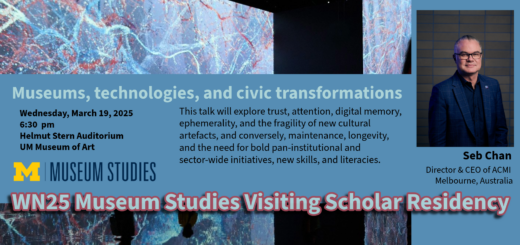The museum studies proseminar is a year-long course that provides an introduction to a range of historical and contemporary issues associated with the museum. As such, it offers an intellectual framework for engaging the institution “a means for thinking critically and creatively about museums” that will serve as a foundation for further study and preparation for work in the museum world.
The proseminar is organized around six modules that explore a range of issues “historical, social, economic, educational, ethical, legal, technological and administrative” that concern the world of museums. Each module will include three or four sessions that will bring members of the U-M faculty and/or practitioners from local/regional museums into the proseminar to present case studies that will serve as the foci for discussions of the issues at hand.
Fall Semester
- What Is A museum?
- Object and Authenticity
- Object and Audience
Winter Semester
- Defining / Designing Museum Space
- Museums and Mediation
- Rationalizing the Museum
Other Expectations
In addition to weekly readings, each student is expected to:
- Join a professional museum organization.
- Subscribe to an electronic discussion list (e.g., H-Museum, Museum-L).
- Monitor current media coverage of the museum world.
- Attend no less than three MSP-sponsored public events (including brown bags) each semester.
- Attend six day-long site visits to regional museums that will be organized during the year.
- Fall: The final project for the semester is a critical synthesis of the issues situated around the nature of the “object” that has been considered over the semester. Discussion should draw upon readings, seminar meetings, site visits, and other pertinent experiences.
- Winter: The final capstone project for the year-long proseminar in museum studies involves developing a preliminary proposal for an exhibition or related-museum project in a specific museum setting.
* Please note, the Museum Studies Proseminar is not available as an online class. Students engage with each other in person throughout the semester in the classroom and in smaller groups at their capstone project sites.


